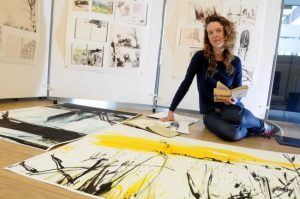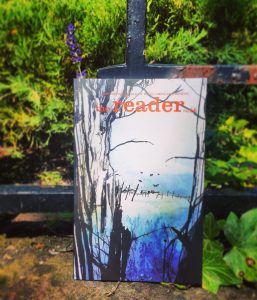The Reader 66
My oh my have we got a cracking magazine for you this quarter! The summer edition is out now, jam-packed with fantastic new writing, powerful personal essays and all the latest Reader thinking.
Where to start between the covers of the latest Reader mag? Perhaps with the beautiful artwork itself, created by illustrator and lecturer Louise Weir who features in the issue with an intimate reflection on her latest work, Expectations of the Past.
 Inspired in equal parts by Charles Dickens' beloved novel Great Expectations and the death of Weir's own much-loved father, the artist explores a new emotional landscape through a very personal, investigative journey through memory, loss and identity.
Inspired in equal parts by Charles Dickens' beloved novel Great Expectations and the death of Weir's own much-loved father, the artist explores a new emotional landscape through a very personal, investigative journey through memory, loss and identity.
"There wasn't any grand scheme, I was just really suffering and I had this stuff inside that I had to get out ... It was compulsive, a coping mechanism; I couldn't not do it. I've always used drawing in that way, but the writing was new. It felt more honest and more immediate to write, somehow."
Recognising a familiar pattern between her own life and that of Dickens' Pip, Weir began exploring her own personal history: "...it was as though a dialogue opened up between the text and my own memories". The two worlds have fused to create a "make-believe space" where ghosts exist, both from the novel and her childhood. Growing up in her father's pub in the small hamlet of Hatton, Weir recalls the regulars who formed such a great part of her childhood in a new Dickensian light.
Some of the illustrations and poems which feature in Expectations of the Past are included among the pages of Weir's essay, adding another, visual dimension which she says has become central to her new approach to reading too:
"I've been reading a lot more since I started this project ... I think I used to read books as stories, I'd read for plot, that kind of page-turning excitement but I don't think I do anymore: I read them now as kind of visual things."
Read more from Louise Weir's An Emotional Landscape in The Reader 66.
Several threads run throughout the pages of The Reader magazine Issue 66, connecting strands of the same conversations, drawing on the same inspiration and Louise Weir's piece is no exception. From where Weir's thoughts on the visual infiltrating the written word drop off, The Reader's own Grace Farrington picks up the question of how illustrations might be interpreted in Shared Reading groups in her regular slot, The Reading Revolution.
While the sense of loss which is ever-present throughout Weir's essay also threads its way through a number of this issue's wonderful features.
CRILS' Rhiannon Corcoran writes candidly, almost confessionally, about how her mother's life - marked by emotional distress, and death - marked by tragedy, have influenced her as a mother, a psychologist and a person.
"As a young person I was anxious and found life, on the whole, rather trying. After my mother's death even quite big hassles - like my dog literally tearing to pieces a whole couch one day when she had had to be left alone - really didn't matter. Things that could be replaced or fixed REALLY DID NOT matter. This state of enlightenment suddenly just happened within me and it has completely transformed the way I deal with life. It has not made me optimistic but it has made me tougher. I regard this as my mother's parting gift."
Corcoran, whose poem Not as You know it features alongside this essay, reassures us "There is no cure for distress. We all must acknowledge its role in the world, accept it, cope with it and, if we can, for the sake of others, keep getting back up after it", advice which might bookend any number of conversations within the covers of the magazine, or indeed any number of Shared Reading groups across the country. It is advice which has inspired the Only Us campaign which encourages conversation about mental health.
Read more from Rhiannon Corcoran's Mothers in The Reader 66.
Corcoran's considerations about how we treat distress is echoed in an essay by Dr Iona Heath, past president of the UK Royal College of General Practitioners, who reflects on the pressures which threaten our NHS.
"The culture of responding to demand rather than need has promoted the notion that there must be a 'pill for every ill'. Many symptoms are caused by the stresses of daily living, and by pressures and abuses within relationships at home and at work. Medicalising these may bring some temporary relief but does nothing to make life better in the long run."
Heath voices her fear that the regime of austerity imposed by the current government does not accommodate the "one-for-all and all-for-one" purpose of the NHS:
"Public investment in health and social care, housing, the arts and education in schools, universities, and even libraries, has come to be regarded as
somehow reprehensible. If these services cannot make their way and turn a profit in the marketplace there is an implication that they should be allowed to wither and die."
In a wonderful interview with The Reader's Fiona Magee, Director of The Poetry Archive, Tracey Guiry, explores how her personal experience of loss, through her mother's diagnosis of dementia, inspired a national movement of creative engagement with those affected by memory loss.
"My mum was - I shouldn't talk about her in the past, she's still with us, but she's not the same though - is still very social, very outgoing, lots of laughter. There were six of us children and her illness went off like a grenade in the middle of family life. When memory starts to fail what happens to those relationships and how can you keep in touch with that person you love and who loves you - how can you keep that connection? The great gulf of forgetting open up and it's really hard getting across it."
Guiry found that poetry helped to keep that connection alive. Reading The Listeners by Walter De La Mare with her mother, Guiry realised the potential poetry had to open closed doors and unlock memories: "she started telling me lots of other things about her early life, the evacuees and munitions factory closing down, stories I'd heard before but not for a long time. Then she told me something that I'd never heard before."
It was this personal breakthrough that encouraged Guiry to co-found National Memory Day, which celebrates the power of poetry and the positive impact of creative engagement with those affected by memory loss on March 18.
New poems from Stuart Pickford, Ian Patterson, Patrick Wright and David Constantine all touch on the loss of something, or the threat of it, while Gary Allen's Cutting reads as a modern take on Seamus Heaney's Digging, exposing the ever-present human condition which prevails throughout the new poems in the latest edition.
And the new fiction in this edition, Never Catch a Falling Knife, comes from Nicky Bennison, who previously worked for The Reader and now runs the voluntary organisation Leicestershire Shares Reading who work closely with The Reader to deliver Shared Reading groups in the region.
"Hayley opened the window. A froth of dead plants flopped form the window-box her mother had planted up before she left. She turned around. Her dad's face had a bluish sheen, but it was just from the TV's reflection. There were two empty cereal bowls and spoons on the couch, three beer cans on their sides underneath it, and a pizza box. When she was part of this squalor she had never really noticed it."
Read Nicky Bennison's fantastic Never Catch a Falling Knife in full in The Reader 66.
Reading Recommendations this quarter comes from guest writers Aggie Shepherd and Michael Schmidt, founder and director of Carcanet Press and editor of PN Review, with new recommendations from our regular writers Angela MacMillan, Brian Nellist, and award-winning novelist and screen writer, Frank Cottrell Boyce.
The Reader's founder and director, Dr Jane Davis, reflects on her personal reading in Me With My Heels Dug In. Contemplating on her long-enduring love for George Herbert, Davis wonders how we can still love the writers we disagree with:
"Herbert is a Christian and believes in life with God after death. But I don't. I'm not coming with you in this thought, George. I stop reading and thinking here, leaving it for another day. And me with my heels dug in."
And as ever, The Reader magazine offers up powerful reflections on the power of our Shared Reading work across the UK. In this edition's Reading Lives 'Frances M' discusses how Shared Reading helped her to find meaning and escape after a serious mental health breakdown in A Difficult Sentence:
"I don't really want to think about the hospital or the depression, although they've told me I'm not supposed to suppress it - but not everything in life has to be about it."
Jamie Jones, a graduate from University of Liverpool, writes openly about depression, anxiety and mental distress, and finding comfort in an unlikely place in What George Eliot Taught Me:
"As I read it, it was as though some sort of powerful chemical reaction began, without understanding; I felt I had within me whatever it was that I needed to be able to trust myself as an adult."
Reader Regular Ian McMillan draws the threads of Jones' piece through into his own column, which this quarter, recalls his trepidation about leaving factory work to become a full-time freelance writer in Thatcher's Britain. With Nettles to Grasp, McMillan leaves us with a message of hope amid personal experiences of distress and national feelings of dismay:
"...these are terrible times, and we are in the grip of an uncaring government, but they were terrible times then,
and we were in the grip of an uncaring government. But, in practical terms, there are still pots of money to apply for, opportunities to seize, nettles to grasp. Hope is still available to us. Dreams can still be followed."
 The Reader
The Reader
To purchase a copy of the latest edition of The Reader magazine or to take out a subscription, visit our website.
The Reader magazine Issue 66 - £6.95
Subscriptions start from £24.00
Share
Related Articles

Shared Reading in Wirral Libraries: ‘As a kid people read stories to you but as an adult you lose that – and it’s a fantastic thing to do!’
Two Strategic Librarians for Wirral Libraries, Kathleen McKean and Diane Mitchell have been working in partnership with the UK’s largest…

Open Air Cinema FAQ’s
If you were able to snap up tickets to our brand new Open Air Cinema, check below for any queries…

New Liverpool open air cinema brings movies to the Mansion
NEW FOR 2025: Eight handpicked films will hit the big screen in Calderstones Park this summer as national Shared Reading…


